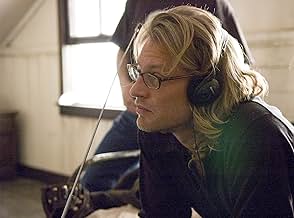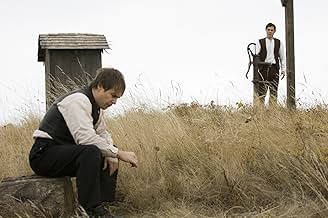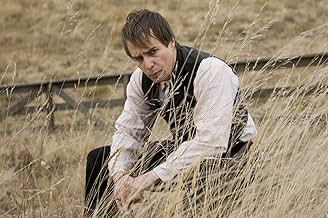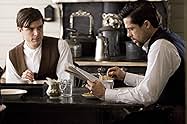El asesinato de Jesse James por el cobarde Robert Ford
Robert Ford, quien ha idolatrado a Jesse James desde su infancia, intenta unirse al grupo del proscrito, pero su adoración poco a poco se convierte en resentimiento.Robert Ford, quien ha idolatrado a Jesse James desde su infancia, intenta unirse al grupo del proscrito, pero su adoración poco a poco se convierte en resentimiento.Robert Ford, quien ha idolatrado a Jesse James desde su infancia, intenta unirse al grupo del proscrito, pero su adoración poco a poco se convierte en resentimiento.
- Dirección
- Guión
- Reparto principal
- Nominado para 2 premios Óscar
- 25 premios y 69 nominaciones en total
- Baggagemaster
- (as James DeFelice)
- Danish Train Passenger
- (as Torben S. Hansen)
Reseñas destacadas
I loved this movie. Unfortunately, a long western without action is something seemingly impossible to sell to the public these days. It would be to the advantage of the studio to sell this like The English Patient was sold 10 years ago. Just make people feel like ignorant idiots if they don't like it! As much as it pains me to say it, I think most people don't care enough to bother seeing what makes this movie so great. The only other option to make this a success is to fool them into THINKING they love the movie. I'm really curious how many folks out there that like the movie agree with me here.
The film tells the story of the James Gang and specifically the fatal relationship of Jesse James and Robert Ford. During the course of the action we see darkness and light in everyone, even the "coward." Care is taken to finely pare into the psyches of these Outlaws and the cold world they walk in. I think I saw just about every emotion there is to have in these men and we can almost understand, even if we can't accept, what moves them in their deadly paths.
Pitt is both iconic and vulnerable - beautiful and frightening as Jesse James, a robber and killer who hoists up a reputation of fearless boss on one shoulder and charming folk hero on another. His character's movement through peril and praise reminds one of the great gangster characters from Scorsese's work, with an added rawness that only Pitt and a few others can genuinely summon. His fatalism is also quite entrancing and subtly masterful.
Affleck is truly mesmerizing as a born misfit who is so uncomfortable in this world around him, that his neuroses, if they can be called that, really get into your skin. I was reminded of Joaquin Phoenix's role as Comodus, but it's even more intense and yet so very believable. As the audience, I was torn between pitying the character, being utterly disappointed in him, and just wanting him to somehow be better. And the script's maturity really comes into play with this character. No one is beyond reproach, understanding, or grim fate.
I'd say that's the main theme here: fate.
There's no easy formula. No one simply "gets what's coming to them." There are no simple villains or heroes. There's just life and the actions taken and the echoes of those actions and eventually, an end. It transcends any petty ideas of justice or even legend. It takes a full snapshot of a beautiful and grim reality and lets us just take it in, like a corpse on ice. Profound by presentation alone.
Visually, the film soars beyond anything that has hit the screen since Conrad Hall's final masterpiece with Road to Perdition. Roger Deakins, the cinematography genius behind The Shawshank Redemption, Kundun, and all the Cohen brothers" films since The Hudsucker Proxy, surpasses his best work. He pulls out all the stops hereintricately orchestrated changes in focus, richly textured colors, dazzling use of light sources, careful manipulations of time, powerfully significant fade-ins and fade-outs, and shots through rain, snow, and rippled old glassto communicate the story. Deakins' contribution stands out in the railroad train robbery sequence at the beginning of the film. Clearly defined, flickering light sources and deep black shadows create a dazzling, nightmarish vision that haunts the rest of the film. This sequence alone is worth the price of admission.
The richly textured, historically precise visual aspects of the film bring to mind Terrence Malick's Days of Heaven and Robert Altman's McCabe and Mrs. Miller. However, instead of the understated, "realistic" performances featured in those films, The Assassination of Jesse James showcases powerful, yet still realistic performances by an outstanding ensemble cast.
Sam Rockwell, as the not-too-bright but well-meaning Charley Ford, and Mary-Louise Parker, as Jesse's loving wife, stand out. Yet the film belongs to the two titular leads, both of whom deliver the performances of their careers and create characters filled with disturbing contradictions. Brad Pitt's Jesse James is alternately pitiable and terrifyingan affectionate, loving father, an old-before-his-time sage, an adventurous daredevil, an unrepentant bad boy, and a vicious sociopath. Casey Affleck's Robin Ford is a complex, repellent, and tragic character who challenges the audience's complicity in the undercurrents of the film.
All in all, this is a great filmnot for those seeking the simple pleasures of instant gratification. But definitely worth the attention of those who still believe that movies are an art form.
"Jesse James" delves deep into the inner conflicts and emotions of every character. We live with them, eat with them, and often feel their pain or their confusion. This confusion is often associated with the bi-polar nature of the film's central character, Jesse James, played by none other than Brad Pitt. Casey Affleck delivers a subtle performance here that actually becomes the most effective as the film progresses over its 160 minute running time. I hated Robert Ford for a good portion of the film, thought he was so annoying and clingy that it was a wonder Jesse James didn't kill him within the first day of their complex relationship. But then, as I sat through the so called "gruelling" running time of the film, I learned to feel for him and understand his motives and attraction for Jesse. But ultimately, his childhood, comic book worship of the famous outlaw changes.
The "style" of the film is evident in the first frame of passing clouds. Roger Deacon's cinematography is the best I've seen since Conrad Hall's work in Road to Perdition, perhaps better. He is definitely winning the Oscar this year, between this and No Country For Old Men. There is a scene involving a train robbery where the visuals and utter style blew me away. The lighting and camera direction becomes more subtle and less noticeable after the train scene, but, does not lessen in quality and pure artistry. There is a topic on the IMDb message boards approaching the topic of whether certain films should be labeled "art films." Well all films are works of art, some are horrendous, some are extraordinary. Well, The Assassination of Jesse James by the Coward Robert Ford is an extraordinary work of art.
But was that accepted version the real story? For the first time the Ford brothers, Robert and Charley, get their due. As played by Casey Affleck, Robert Ford was a most complex character indeed. Ford is shown for what he was, a moonstruck kid who was brought up on those dime novels and idolized the legendary bandit. The fact that Charley was already riding with the James gang got him into the group.
After the last job the James gang pulled and the only Ford was ever in on, the Fords kind of attached themselves to Jesse James. Of course the idol is no hero. Brad Pitt plays a most unheroic Jesse.
Hints of Pitt's interpretation of Jesse's character are found in the classic portrayal of Jesse James by Tyrone Power. Remember when the laconic Henry Fonda as Frank James dresses Jesse down, tells him he's getting mean, meaner every day even with some of his own gang members? Power was showing signs of it, but we see Pitt as Jesse do some really brutal and cruel things. At the same time he's a loving husband to Mary Louise Parker and doting father to his two children.
As good as Pitt is I think the acting honors go to Casey Affleck. His gradual disillusion with his idol is really something to see on the screen. He becomes really scared of Pitt for reasons I won't reveal, but were definitely sufficient to want him to get Pitt.
We also get to see the Fords sorry aftermath. Things did not go so well for them. Bob Ford did not quite get the acclaim he would have liked as Jesse James became bigger after death than in life.
Frank James as played briefly in the beginning is an odd peripheral character in this film. The James brothers did separate some months before Jesse's death. Frank is played by Sam Shepard who has an encounter with young Bob Ford at the beginning of the film and announces to one and all, the kid creeps him out. But Jesse likes having the kid follow him around like a puppy dog to his ultimate regret.
The Assassination of Jesse James by the Coward Robert Ford is a very good western and we sure don't see too many of them in these times. It's shot in an unusual color, almost like one of those sepia-tone films that were in vogue for a brief spell. The location shooting was done in western Canada and looks a whole lot more like Missouri then than Missouri does now.
¿Sabías que...?
- CuriosidadesCinematographer Roger Deakins has called the arrival of the train in darkness as one of the high points of his career.
- PifiasJesse James uses the term "gunslinger" but this term didn't come into use until at least the 1920's. Terms for outlaw gunmen appropriate for the time would have been gunman, pistoleer, shootist, or even gunfighter.
- Citas
[last lines]
Narrator: He was ashamed of his persiflage, his boasting, his pretensions of courage and ruthlessness; he was sorry about his cold-bloodedness, his dispassion, his inability to express what he now believed was the case- that he truly regretted killing Jesse, that he missed the man as much as anybody and wished his murder hadn't been necessary. Even as he circulated his saloon he knew that the smiles disappeared when he passed by. He received so many menacing letters that he could read them without any reaction except curiosity. He kept to his apartment all day, flipping over playing cards, looking at his destiny in every King and Jack. Edward O'Kelly came up from Bachelor at one P.M. on the 8th. He had no grand scheme. No strategy. No agreement with higher authorities. Nothing but a vague longing for glory, and a generalized wish for revenge against Robert Ford. Edward O'Kelly would be ordered to serve a life sentence in the Colorado Penitentiary for second degree murder. Over seven thousand signatures would eventually be gathered in a petition asking for O'Kelly's release, and in 1902, Governor James B. Ullman would pardon the man. There would be no eulogies for Bob, no photographs of his body would be sold in sundries stores, no people would crowd the streets in the rain to see his funeral cortege, no biographies would be written about him, no children named after him, no one would ever pay twenty-five cents to stand in the rooms he grew up in. The shotgun would ignite, and Ella Mae would scream, but Robert Ford would only lay on the floor and look at the ceiling, the light going out of his eyes before he could find the right words.
- Créditos adicionalesThe film does not contain either an opening title nor intro credits. The film title is displayed first after the final fadeout.
Selecciones populares
Detalles
- Fecha de lanzamiento
- Países de origen
- Sitios oficiales
- Idiomas
- Títulos en diferentes países
- The Assassination of Jesse James
- Localizaciones del rodaje
- Empresas productoras
- Ver más compañías en los créditos en IMDbPro
Taquilla
- Presupuesto
- 30.000.000 US$ (estimación)
- Recaudación en Estados Unidos y Canadá
- 3.909.149 US$
- Fin de semana de estreno en EE. UU. y Canadá
- 147.812 US$
- 23 sept 2007
- Recaudación en todo el mundo
- 15.004.260 US$
- Duración2 horas 40 minutos
- Color
- Mezcla de sonido
- Relación de aspecto
- 2.39 : 1
Contribuir a esta página






































